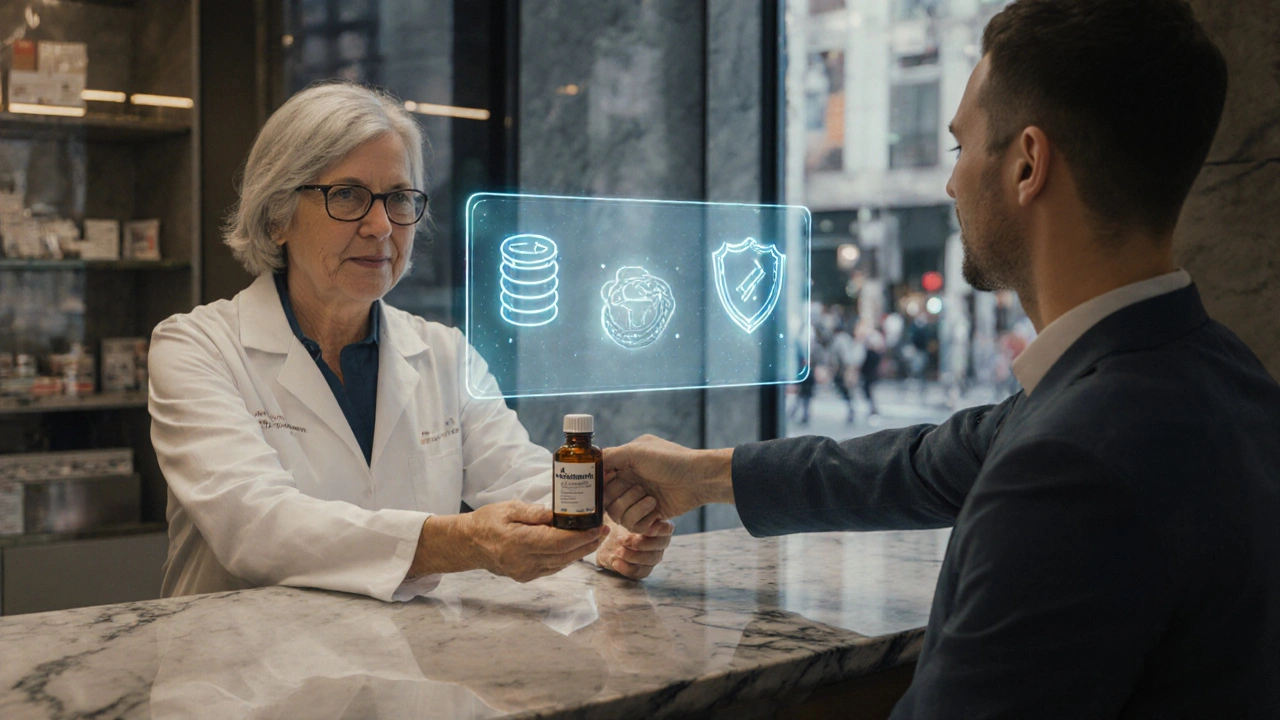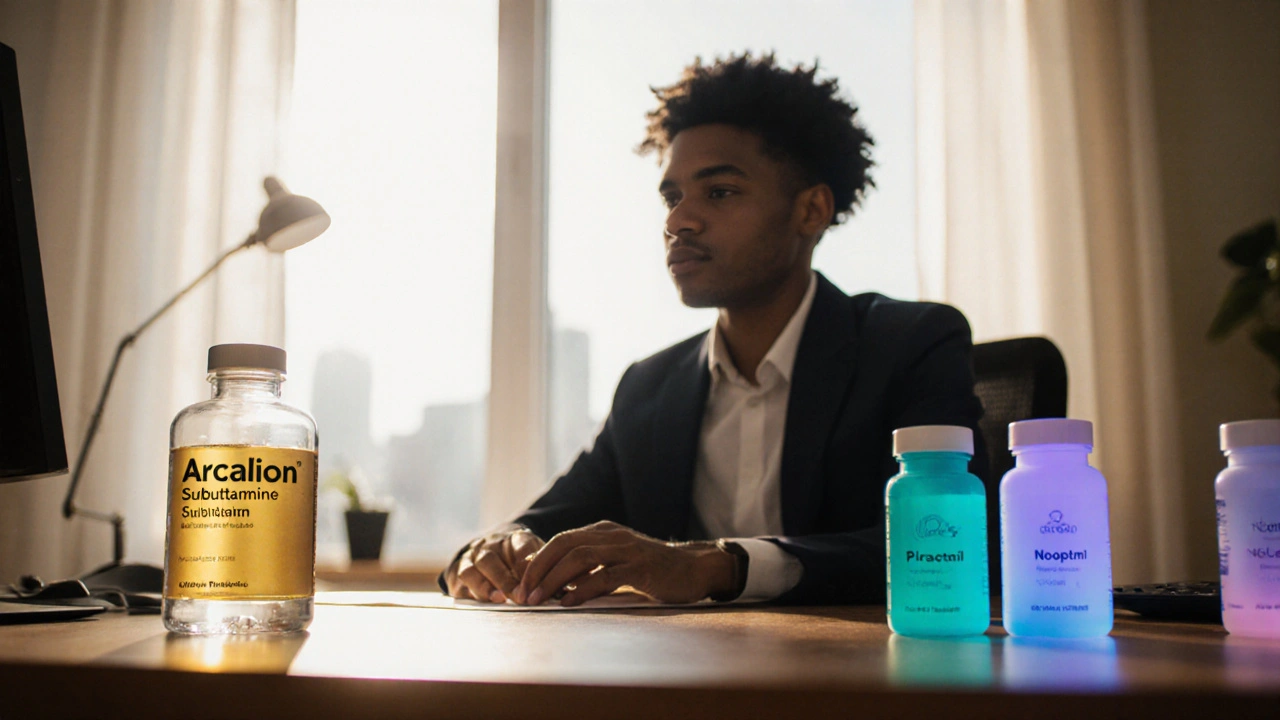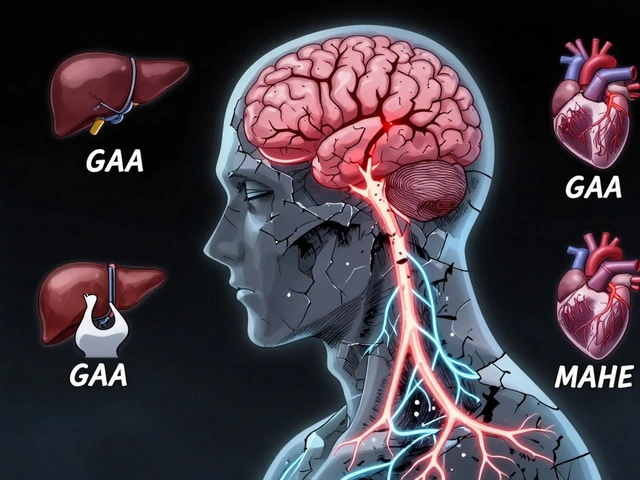Nootropic Supplement Comparison Tool
Select a supplement to compare its benefits, onset time, and monthly cost.
TL;DR
- Arcalion is a synthetic B1 derivative that crosses the blood‑brain barrier quickly.
- Benfotiamine offers similar B1 benefits but with stronger peripheral support.
- Acetyl‑L‑carnitine fuels brain mitochondria and improves focus.
- Bacopa monnieri is a plant herb that enhances memory over weeks.
- Rhodiola rosea helps with fatigue and stress, not directly a memory booster.
When you start hunting for a mental edge, the first name that pops up is often Arcalion (the branded form of Sulbutiamine). It promises faster alertness, better mood, and a quick lift without the jitter you get from caffeine. But the supplement aisle is crowded - you’ll also see Benfotiamine, Acetyl‑L‑carnitine, Bacopa monnieri, and Rhodiola rosea listed as “better” or “safer”. This guide breaks down what each does, how they compare, and which one fits your routine.
What is Arcalion (Sulbutiamine)?
Sulbutiamine is a lipophilic derivative of thiamine (vitaminB1). By attaching two thiamine molecules together, chemists created a compound that slips through the blood‑brain barrier 3‑4 times more efficiently than regular thiamine. Once inside the brain, enzymes split it back into active thiamine, replenishing neurotransmitter synthesis and cellular energy.
Typical dosage ranges from 200mg to 600mg per day, split into two doses. Users report a mild uplift in mood after 30‑60minutes, with a plateau effect after about a week of consistent use.
How does Arcalion work?
In the brain, thiamine is a co‑factor for enzymes that turn glucose into ATP - the fuel cells need to fire fast. More ATP means neurons fire more reliably, which translates into sharper focus and better short‑term memory. Additionally, thiamine supports the synthesis of acetylcholine, a neurotransmitter tied to learning.
Because sulbutiamine reaches the brain quickly, you feel the cognitive boost sooner than you would from regular thiamine supplements. That speed is the main selling point for people who need an on‑the‑go lift - gamers, students cramming for exams, or professionals pulling late‑night sprints.
Top alternatives to Arcalion
Below is a quick snapshot of the most common substitutes. Each has its own strength, so you can match it to your goals.
- Benfotiamine: a fat‑soluble B1 analog that stays in the bloodstream longer, excellent for nerve health and metabolic support.
- Acetyl‑L‑carnitine (ALCAR): transports fatty acids into mitochondria, boosting cellular energy and often paired with memory‑enhancing stacks.
- Bacopa monnieri: an Ayurvedic herb that enhances synaptic communication after several weeks of consistent use.
- L‑theanine: an amino acid from tea that smooths out the jitter from caffeine while improving attention.
- Rhodiola rosea: adaptogen that reduces mental fatigue under stress, but its memory‑boosting effects are milder.

Detailed comparison table
| Supplement | Typical Daily Dose | Key Mechanism | Onset of Effect | Primary Benefits | Cost (USD/month) | Safety Profile |
|---|---|---|---|---|---|---|
| Arcalion (Sulbutiamine) | 200‑600mg | Rapid brain B1 delivery → ↑ ATP, ↑ acetylcholine | 30‑60min | Improved mood, short‑term memory, alertness | ≈ $30‑$45 | Generally well‑tolerated; rare headache, skin rash |
| Benfotiamine | 150‑300mg | Fat‑soluble B1 → prolonged plasma levels | 2‑4hrs | Peripheral nerve support, glucose metabolism | ≈ $20‑$35 | Very low risk; mild GI upset possible |
| Acetyl‑L‑carnitine | 500‑1500mg | Transports fatty acids into mitochondria → ↑ energy | 1‑2hrs | Focus, mental fatigue, neuro‑protection | ≈ $25‑$40 | Well‑tolerated; occasional fishy odor, insomnia at high dose |
| Bacopa monnieri | 300‑450mg (standardized 20% bacosides) | Modulates NMDA receptors & antioxidant activity | 3‑4weeks | Long‑term memory, stress resilience | ≈ $15‑$30 | Generally safe; may cause mild GI upset |
| L‑theanine | 100‑400mg | Increases alpha‑brain waves → calm focus | 15‑30min | Reduced anxiety, smoother caffeine boost | ≈ $10‑$20 | Very low risk; rare headache |
| Rhodiola rosea | 200‑400mg (standardized 3% rosavins) | Adaptogenic cortisol modulation | 30‑60min | Stress resistance, mental stamina | ≈ $15‑$25 | Generally safe; possible irritability if over‑dosed |
Choosing the right option for you
If you need a quick pick‑me‑up before a meeting or a gaming session, Arcalion’s fast onset makes it hard to beat. But if your primary concern is chronic nerve pain or diabetic support, benfotiamine’s longer‑lasting plasma levels are more targeted.
For people chasing deep‑learning gains over weeks, Bacopa’s gradual build‑up beats any single‑dose stimulant. And if you already rely on caffeine, stacking L‑theanine with a modest dose of Arcalion can smooth out the edge while keeping the alertness.
Remember: no‑otropic stacks are personal. Start with the lowest effective dose, monitor how you feel, and avoid mixing multiple B1 derivatives at once - the body can only convert so much thiamine at a time.
Safety, side effects, and interactions
All the supplements listed have good safety records when used as directed. Common mild side effects include:
- Arcalion: headache, skin rash, occasional digestive upset.
- Benfotiamine: mild nausea.
- ALCAR: insomnia if taken too late, fishy breath.
- Bacopa: stomach cramps, increased bowel movements.
- L‑theanine: virtually none.
- Rhodiola: jittery feelings if overdosed.
Because sulbutiamine mimics thiamine, high doses can interfere with blood‑sugar‑lowering medications. If you’re on insulin, metformin, or any diabetic drug, check with a pharmacist first. The same precaution applies to benfotiamine.
Mixing ALCAR with thyroid medication can slightly increase heart rate, so space them out by a few hours. Otherwise, most of these compounds coexist peacefully.
Buying tips and dosage guidance
Look for third‑party tested brands. The label should list the exact amount of the active ingredient (e.g., 200mg sulbutiamine per capsule). Avoid “proprietary blend” formulas for Arcalion - you want transparency.
Start with the lowest dose (200mg of sulbutiamine) taken in the morning. If you feel good after a week, you can bump to 400mg split into morning and early afternoon. For benfotiamine, 150mg once daily is enough for most adults. ALCAR is best taken on an empty stomach for optimal absorption.
Cycle wisely. Many users run a 4‑week on / 1‑week off schedule for Arcalion to keep the brain’s receptors from down‑regulating. Plant‑based herbs like Bacopa and Rhodiola benefit from continuous use, but a short break every two months can prevent tolerance.
Bottom line
Arcalion shines when you need a rapid, mood‑lifting boost without the crash of caffeine. Benfotiamine is the go‑to for long‑term nerve health, while ALCAR fuels cellular power for sustained focus. Bacopa delivers memory gains over weeks, and L‑theanine smooths any jitter you might pick up from stimulants. Match the supplement to the timeline of your goal, and you’ll get the most bang for your buck.

Frequently Asked Questions
Can I take Arcalion and benfotiamine together?
It’s not recommended because both supply thiamine in different forms. Combining them can lead to excess B1, which may cause mild nausea. Choose one based on your primary goal - fast brain boost (Arcalion) or peripheral nerve support (benfotiamine).
How long does it take for Bacopa to show results?
Most users notice a subtle improvement after 3‑4 weeks of consistent dosing, with peak benefits around 8‑12 weeks. Patience is key; Bacopa works by gradually enhancing synaptic communication.
Is Arcalion safe for long‑term use?
Clinical data suggests it’s safe for up to 12months at typical doses, but many experts advise cycling (4weeks on, 1week off) to avoid receptor down‑regulation and keep the effect fresh.
Can I stack Arcalion with caffeine?
Yes, the combo works well for many people. If the jitter feels too strong, add 100‑200mg L‑theanine to smooth the edge while preserving alertness.
What’s the cheapest alternative with similar benefits?
Benfotiamine often costs less per month and still boosts brain thiamine levels, though its onset is slower. If you’re okay with a 2‑hour window, it’s a budget‑friendly pick.








Tom Shepherd September 28, 2025
Arcalion works but I swear I felt better just drinking green tea with L-theanine. No joke.
Jauregui Goudy September 29, 2025
I've been stacking Arcalion with ALCAR for 3 months now and my focus is insane. No crash, no jitters, just pure mental clarity. I used to need 3 espressos to get through a work sprint-now I just take 400mg sulbutiamine and go. If you're into biohacking, this combo is gold. Don't sleep on the mitochondrial boost from ALCAR-it's like giving your brain a turbocharger.
Rhiana Grob October 1, 2025
I appreciate how thorough this breakdown is. It's rare to see a post that doesn't just hype one supplement. I've tried Bacopa for 10 weeks and honestly, the memory improvement was subtle but real-like remembering names I used to forget. Not a magic pill, but a quiet upgrade. Also, cycling is smart. I learned the hard way that continuous use leads to diminishing returns.
Frances Melendez October 2, 2025
People still take this stuff? You're literally chemically modifying your brain chemistry to cope with a culture that rewards burnout. Why not just sleep more, eat real food, and stop scrolling? This isn't optimization-it's avoidance disguised as productivity.
Jonah Thunderbolt October 3, 2025
Arcalion? So… 2020? 🤡 I mean, come on. If you're not stacking Noopept with Phenylpiracetam and a touch of Lion’s Mane, you're basically just… meditating with a vitamin B1 patch. I’m on 10mg Noopept + 500mg ALCAR + 200mg Rhodiola daily. My neural plasticity is off the charts. Also, I have a PhD in neuropharmacology. Just saying.
Rebecca Price October 3, 2025
I love how this post acknowledges that nootropic use is deeply personal. I’m a teacher and I use Bacopa-not for exams, but to stay calm during chaos. It’s not about being ‘smarter’-it’s about being more present. And honestly? The fact that you mentioned cycling? That’s the kind of responsible advice that’s missing from so many forums. Thank you.
shawn monroe October 5, 2025
ALCAR + Sulbutiamine = neural firehose. 🚀 I’ve been running this stack since January. ATP production? Maxed. Mitochondrial density? Increased. Acetylcholine flux? Off the charts. You want neuroprotection? Throw in 100mg L-theanine and you’re basically running a high-performance AI in a human body. Don’t forget to hydrate though-this stack dries you out like a desert.
marie HUREL October 5, 2025
I tried Arcalion for a week and felt a bit too wired. Switched to L-theanine and Bacopa instead. Didn't notice anything dramatic, but I slept better and didn't feel like my brain was buzzing. Sometimes the quiet wins.
Leo Adi October 6, 2025
In India, Bacopa is called Brahmi. We've used it for centuries in Ayurveda-not as a 'nootropic' but as part of daily life. My grandmother took it with milk every morning. Maybe we didn't call it 'cognitive enhancement'… but we were just… calmer. Less frantic.
Melania Rubio Moreno October 8, 2025
Arcalion is just sulbutiamine? I thought it was some fancy French drug lmao. And why is everyone so obsessed with brain fuel? I just want to stop forgetting where I put my keys.
Gaurav Sharma October 8, 2025
This is a dangerous post. You are promoting chemical dependency under the guise of cognitive optimization. The human brain is not a machine to be tuned. You are contributing to a culture of pathological self-improvement. Shame.
Shubham Semwal October 8, 2025
Lmao Benfotiamine for brain? Bro that's for diabetics with neuropathy. You think your brain is gonna light up like a Christmas tree from that? Arcalion or bust. The rest is just vitamin fluff.
Sam HardcastleJIV October 9, 2025
One must ask: in a world where productivity is fetishized, are we not merely commodifying consciousness? The pursuit of cognitive enhancement reveals a deeper existential anxiety-not a pharmacological one.
Mira Adam October 10, 2025
You call this a 'detailed comparison'? Where’s the peer-reviewed data? Where’s the meta-analysis? This is just anecdotal fluff wrapped in a table. You’re not helping people-you’re feeding the supplement industrial complex.
Miriam Lohrum October 11, 2025
It's interesting how we assign moral value to substances. We celebrate coffee, condemn Adderall, and treat Bacopa like a spiritual practice. Maybe the real nootropic is the intention behind its use.
archana das October 12, 2025
In my village, we use Brahmi leaves in tea. No capsules. Just sun-dried, crushed, boiled. My uncle, 82, still remembers every name, every story. Maybe the real secret isn't the pill-it's the rhythm of life.
Emma Dovener October 12, 2025
I’ve been taking Rhodiola for stress for 6 months. It doesn’t make me smarter, but it stops me from crying during Zoom meetings. Sometimes that’s enough.
Sue Haskett October 14, 2025
Please, please, PLEASE-don't mix Sulbutiamine with other B1 analogs. Seriously. I had a friend who took Benfotiamine + Arcalion + a thiamine multivitamin. She ended up in the ER with nausea and heart palpitations. Just… choose one. And hydrate. Always hydrate.